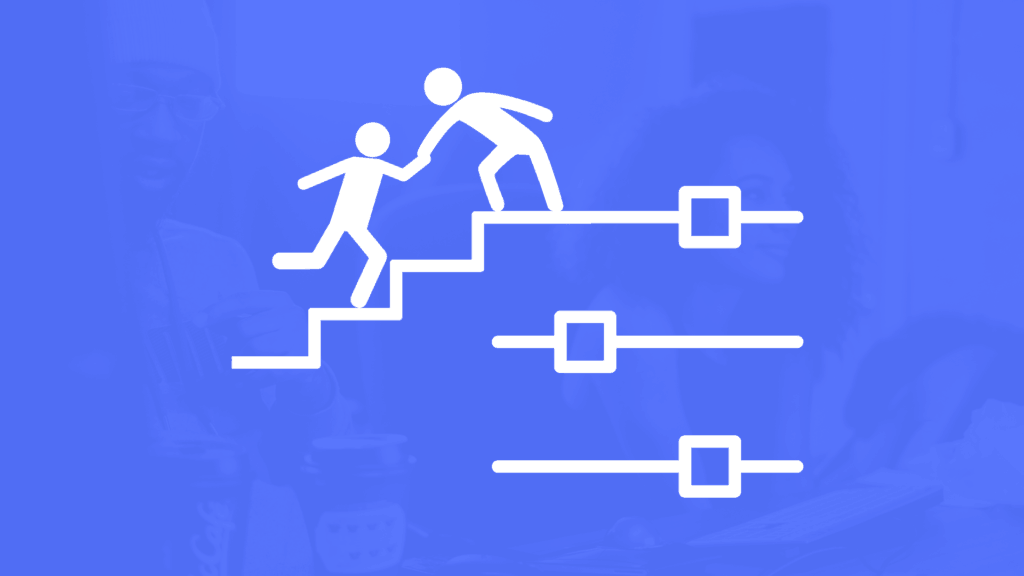This is a comprehensive list of tips for new electronic music producers making songs in 2024.
Read through this list and you’ll learn:
- Tips on workflow and creativity
- Tips for mixing and mastering
- Tips for learning faster
- Tips on mindset and mental game
So if you want to level up your music, let’s get into it.
New to music production? 🧑💻
Watch our Free Masterclass on how to learn electronic music production the smart way (without months of confusion & frustration) 👇
1. Listen to a wide range of music
The best way to improve your creativity is to improve your inputs. If you’re listening to the same genre of music again and again, you’re probably not exposing yourself to new and interesting sounds and ideas.
Make an effort to listen to a diverse range of genres and styles.
2. Practice active listening
There are two types of listening: passive and active.
Passive listening is how we normally listen to music. It’s in the background while we’re doing something else.
Active listening requires full focus and attention. You’re listening to the song with an intense curiosity and interest, paying attention to each little sound, movement, and transition.
It’s one of the best habits you can build as an artist for three reasons:
- You’ll have an endless source of inspiration
- You’ll pick up techniques and ideas that can’t be acquired via books or YouTube tutorials
- You’ll rapidly train your ear
3. Build consistent, daily habits that force you to grow
Developing habits like active listening, generating ideas every day, watching tutorials each week, and pushing yourself to finish a song every month (or however long) is a great way to force artistic growth.
Professionals work on a schedule. They are consistent. They don’t wait for inspiration. They work every day.
If you want to become the best producer and artist you can be, then build habits.
4. You won’t always feel motivated or inspired
When I first got into music production, the first 6 months was a blast. I was so excited to make music every day—nothing was going to stop me.
After a while, I started getting writer’s block. Some days I couldn’t be bothered. The consistency dropped.
But after reading books like The War of Art and understanding that professionals work even when they don’t feel like it, I decided to produce every day regardless of whether I felt motivated.
And that’s when things started changing for me.
So, you won’t always want to produce music. Sometimes that means you need to take a break, but normally you just need to take action and start working on something. The inspiration usually follows.
5. Read more books (don’t just watch tutorials)
Most electronic music producers avoid books because they’re “boring.”
But trust me, reading the right books will level up your production game like nothing else.
Here’s a massive list of books I recommend: The Ultimate Book List for Electronic Music Producers
6. There is no “Best DAW.” Just pick one and GO.
If you’re just starting out, the worst thing you can do is spend days or weeks deciding which DAW to use.
Here’s the truth: each popular DAW is fully-capable of making great music, but only if the user is skilled.
So pick one and get on with it. We recommend Ableton Live, FL Studio, or Logic Pro X (and we have a course for each of these DAWs)
7. Foundational skills over fancy techniques
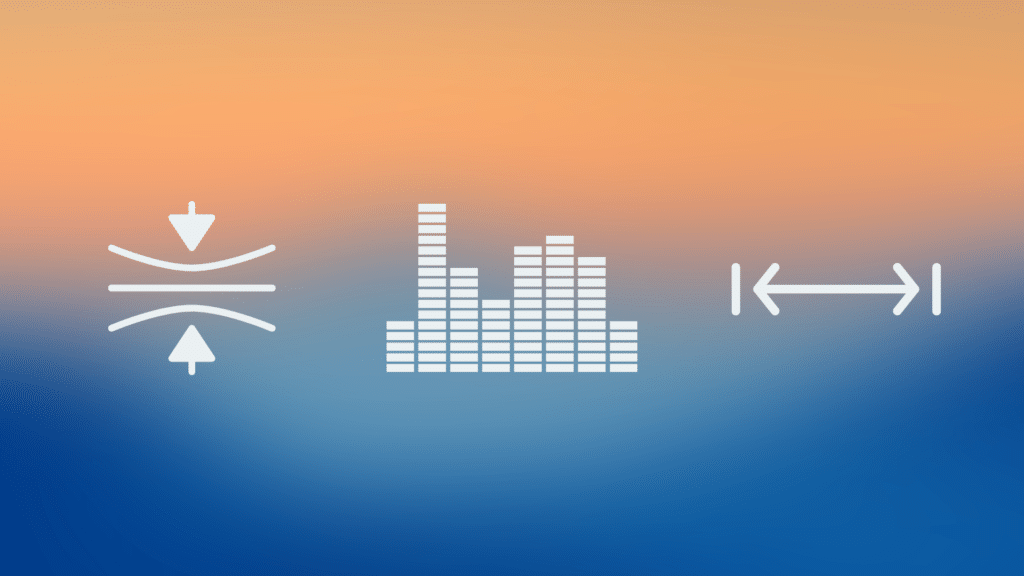
New producers are attracted to the cool techniques that sound impressive.
But if you want to develop as an artist and make great music, you need to build a strong foundation.
Focus on building real skills like songwriting, sound design, mixing, arrangement, and more. Then fill in the gaps with techniques and tactics.
8. Seek out feedback constantly, from producers and non-producers.
Don’t keep your early work under the cover. You need feedback from other producers to know where and how you’re falling short.
There’s no way you can objectively listen to a song you’ve spent hours on. You need a fresh set of ears.
9. Don’t bottleneck yourself with one genre
I made dozens of different genres when I was starting out, and it’s something I’m glad I did.
Don’t feel like you only need to work in one genre—especially when you’re starting out. Jumping around and experimenting is a fantastic way to learn new skills and techniques.
10. Buy a good pair of headphones (before you get studio monitors)
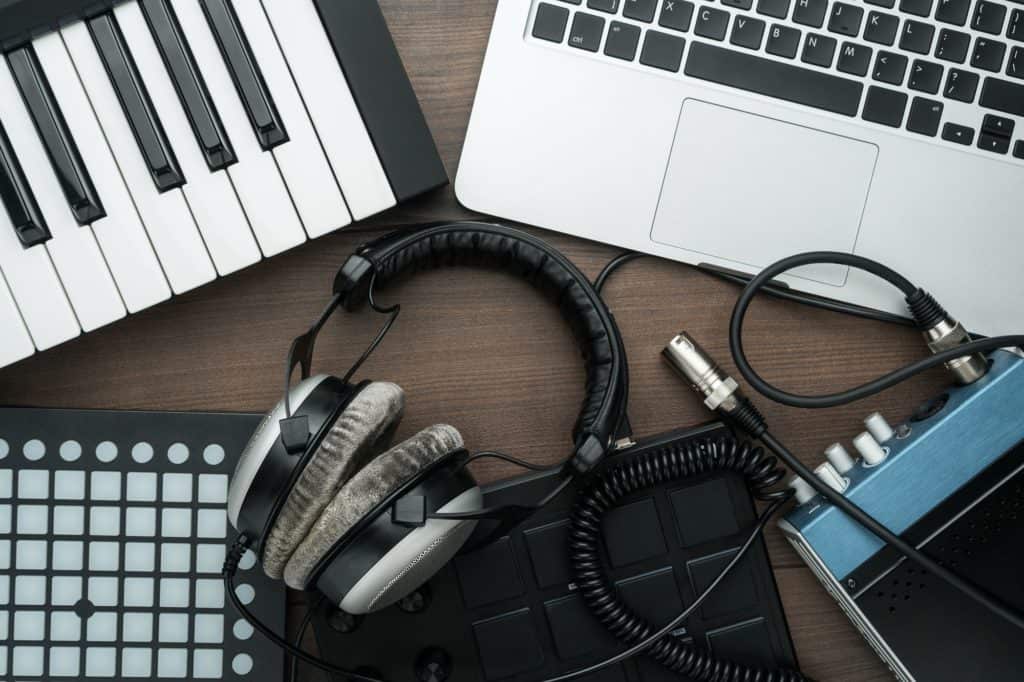
Many new producers go out and buy a pair of studio monitors as soon as they can. This isn’t the best idea unless you have acoustic treatment in your room (and you know what you’re doing).
It’s better to start with a good pair of headphones like Audio Technica ATH-M50s. Cheaper than monitors too!
For more gear advice, check out: The Ultimate Music Production Gear Guide
11. Be as consistent as possible
The best advice I can possibly give you? Produce for an hour, minimum, every day.
Do this for a few years and you’ll be in a great place.
“The most important thing about art is to work. Nothing else matters except sitting down every day and trying.” – Steven Pressfield, The War of Art
12. Learn sound design from the start
One of the best skills to have when crafting a unique style as an artist is sound design.
Many producers put off learning it because it seems complicated, but it’s really not once you get the hang of it.
13. Shortcuts only get you so far
Using tools like MIDI packs and pre-made construction kits may make it easy to finish a song, but it’s not going to sound unique or original unless you use them in creative ways.
But at some point, you have to put in the work to learn how to write great chord progressions, craft catchy melodies, and build an engaging song structure.
Be wary of shortcuts that promise rapid success and results.
By the way, I don’t mean keyboard shortcuts. Those are great for speeding up workflow.
14. You don’t need lots of gear to get started
A laptop with some software and a good pair of headphones is essentially all you need to make music.
Anything else is a helpful bonus.
But don’t fall into the trap of thinking that you need to buy a bunch of stuff to get better. It’s usually a distraction.
15. Don’t stress over marketing and promotion
One of the biggest mistakes new producers make is trying to build their career and brand too early on.
The harsh truth is: it takes a long time to get to a point where your music sounds professional.
If you spend too much time on promotion before then, you’re just pulling time away from what’s most important: working on your craft and finishing music.
You’ll know when the time is right.
16. Collaborate with others as much as possible
Collaborating with other artists and producers—especially in person—is an excellent way to shore up skills and expose yourself to new ideas and techniques.
It’s also a hell of a lot of fun, and beats slaving away in your bedroom studio for hours on end by yourself.
17. Make the music YOU want to make
Following trends won’t make you famous.
Make the music you want to make, and don’t worry about where the industry is moving unless you’re at a point where this is your full-time gig (in which case you probably wouldn’t be reading this).
Every time I followed a trend and made music that was popular (even though I didn’t really like it), I quickly found myself struggling for inspiration.
18. Your best mixing tool is your volume faders
Before rushing to add an EQ, compressor, or other tool to your track, ask yourself whether it’s simply a volume problem.
Often, the best thing you can do is just turn something up or down in your mix. Then use EQ or compression to make it fit a little better.
19. Use highpass EQs often
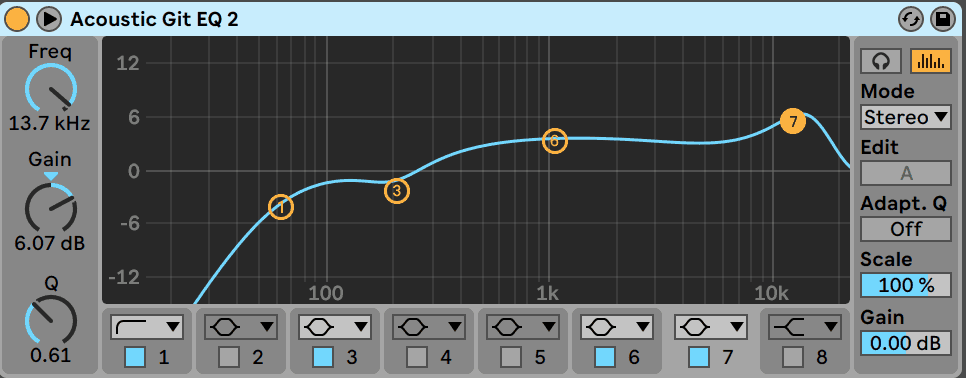
You’ll be surprised at how much low-end information samples contain.
Many hi-hat, snare, and cymbal samples will contain some low-end frequencies that might be unwanted.
Use a highpass filter/EQ regularly to clean up your low-end. But beware, filtering out too much of the low/mid end can result in a weak, flat-sounding mix.
New to music production? 🧑💻
Watch our Free Masterclass on how to learn electronic music production the smart way (without months of confusion & frustration) 👇
20. Learn music theory (at least the basics)
I know, I know. Music theory seems boring.
But it is the language of music, and knowing how to speak this language will help you tremendously as a producer.
Fortunately, there’s a way to learn it practically in the context of electronic music production. Our course Songwriting For Producers shows you how.
21. Know your tools (don’t use something just for the sake of it)
If you don’t know how to use a compressor, then don’t slap it on your snare drum just because you’ve seen other producers do the same.
Take the time to learn how your tools work, so you know when and how to apply them to your project to make it better.
22. You’re only as good as your ears
First, Take care of them (don’t mix too loud).
Second, work on training them. Practice active listening as mentioned earlier. Use reference tracks when producing and mixing.
Consider signing up to something like Soundgym for extra ear training.
23. Balance learning and practice
You should spend some of your time learning new techniques and skills.
- Watching tutorials
- Reading books
- Taking courses
But most of your time should be spent in the DAW making music and applying what you’ve learned.
I recommend an 80/20 split. 80% of your time towards making music, 20% towards learning new stuff.
24. Mastering is overrated
If you’re a new producer, forget about mastering.
Seriously.
You’re better off putting your time into learning songwriting, sound design, mixing, and other key skills.
You can always get someone else to master your music, or use software like Landr.
BUT…
When you’re at the last 5-10% of your song and everything else is in order, it becomes a worthwhile skill to learn.
25. The plugins in your DAW are more than enough to start with
You don’t need to spend $1000+ on premium plugins.
If you’re using a mainstream DAW like Ableton Live, Logic Pro, or FL Studio—you’ve got all you need.
Using a popular synth like Serum may be worth adding to your arsenal (and that’s what we recommend inside our Foundations course)
26. You’re not too old or young
I started producing when I was 14. I know others who started even younger.
I once received an email from a 70-year-old telling me he’d taken up music production and enjoyed learning from this blog.
No matter your age, you can do this.
27. There isn’t a tutorial for everything
Music production is largely about problem-solving. You won’t find a tutorial for every problem or issue you encounter. Sometimes you just need to figure it out.
Get comfortable with this, and try to fix it yourself before asking Google or YouTube. You’ll learn faster and be a better artist.
28. Learn to DJ or perform live
Knowing how your music sounds in a club environment, and knowing how listeners respond to it is invaluable.
When you perform live, you can take your learnings and apply them in the studio.
If you have no interest in performance, but still want to make club-oriented music, it pays to go to a few events and get a feel for what works and what doesn’t.
29. Great artists steal
I’m not saying you should rip off a melody note-for-note, but taking inspiration from other artists and songs is a no-brainer.
As Kirby Ferguson illustrated in his documentary, “Everything is a Remix.”
You can’t avoid taking inspiration from others, so you might as well do it more intentionally.
30. Remake your favorite songs
Remaking music is one of the most difficult yet fastest ways to improve as a producer.
It forces you to listen intentionally, and solve problems. Your ear will develop incredibly quickly, and you’ll pick up techniques that you wouldn’t otherwise.
31. Learn to work with what you’ve got
It’s easy to think that buying a new plugin or synth is the thing you need to spark inspiration and improve your music.
Sometimes, it can be helpful.
But usually it’s a distraction.
Learn to work with what you’ve got. Your DAW, and it’s native plugins, are more than enough (as mentioned earlier).
A good rule of thumb: if you don’t know why you’re buying that plugin, synth, or piece of gear—do you really need it?
32. Learn to play an instrument
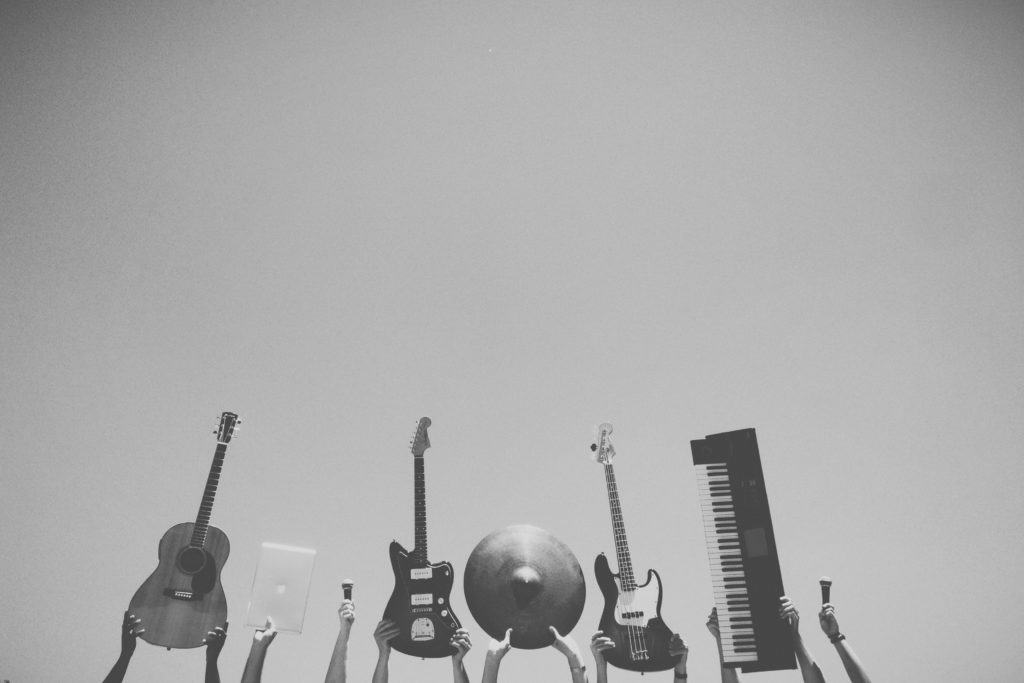
The beauty of electronic music production in 2021 is that you don’t need to know how to play an instrument at all.
However, it does help. And many producers I know who start out without knowing how to play an instrument end up learning how to play one.
If you’re not sure which one to pick, I recommend learning piano. It translates directly to composing music on your computer.
33. Focus on quantity over quality
Paradoxically, the way you make great quality music is by focusing on making a large quantity of music first.
The worst thing you can do as a new producer is spend weeks and months on each song.
It’s better to work quickly. Make one song a week. Yes, some of them won’t sound good, but you’re learning with each project you finish.
34. Keep your samples and projects organized
Knowing exactly where everything is will do wonders for your workflow.
Also, naming your project files logically means it’s easier to find them in the future.
So, instead of titling your project “Untitled_2″. Try to be more descriptive.
I go over this in my Project Extraction Masterclass.
35. Don’t try to learn everything at once
Music production is a multi-faceted craft. It’s overwhelming how many different skills and techniques there are to learn.
My advice? Just focus on a few things to begin with. Songwriting, arrangement, and mixing.
Then move on to more intricate skills and techniques.
36. Read The F***ing Manual (RTFM)
This is age-old advice for a reason.
Don’t ask basic questions on Reddit and Facebook groups that you can find answers to in the manual for your DAW or plugin.
In fact, read through the manual. Especially for your DAW. You’ll learn things you never knew were possible.
37. Never delete your work
Years from now, you might want to revisit an old project.
Don’t delete your work. Even your early stuff that you may not be proud of might still contain an idea that you want to use in the future.
New to music production? 🧑💻
Watch our Free Masterclass on how to learn electronic music production the smart way (without months of confusion & frustration) 👇
38. Follow a proven system
Finally, if you feel stuck and you’re just not sure how to get started…
A bunch of tips like the ones I’ve shared may help, but they aren’t providing what you need.
And what you need is a framework.
A structured approach to learning music production that actually works. Something more than just tips.
If that sounds like you, then our Foundations program is for you.
It’s an affordable, comprehensive course that helps you master the fundamentals of electronic music production by making 4 songs in 4 weeks. And it’s helped over 4,000 producers.

